
January – A Month For Optimisim and Change For The Bar Community
Andy Ives, Editor of BarLifeUK gives us his take on January for the drinks industry. In recent years, January has been taken hostage by moderation and this has had a seismic effect on the hospitality industry. Here he explores why January is such an important month for the on-trade and drink brands and why it can be a time for optimism, despite declining sales.
There is a famous scene in Harry Potter and the Chamber of Secrets that depicts Ron Weasley receiving a letter from his mum, which, once opened, flies out of its envelope and angrily shouts at the boy for driving a forbidden magic car. This sequence offers a pretty good approximation of what it’s like for a drinks writer to check their email in November and December, except in our case, Dry January press releases are doing the shouting, not angry letters from our mums.
This is of course an exaggeration, but only just. PR agencies that represent Non-Alcoholic products enter a release-writing frenzy towards the end of the year, desperate to make sure their brands are able to capitalise on the up-tick in Low/No ABV sales that Dry January brings. Journalists are not immune to the appeal of easily-created content, thus Dry January messaging receives more and more column-inches in trade and consumer publications as the fateful month approaches.
All of which could lead a casual observer to believe the entire UK enters a temperance movement lasting four weeks at Midnight on New Year’s Eve, and alcohol brands might as well stay in bed during January.

This depiction of January as a month of denial and abstinence contains some truth, but not the whole truth, and can also be interpreted in a completely different way, if viewed from a more ‘humans as individuals’ perspective.
Consider these two statistics:
Alcohol Change UK, the charity that formalised the idea of Dry January in 2013, have assessed from their survey research that around 8.5M people (for context, about the same number of people live in London) planned to abstain from alcohol in January this year.
The International Health and Fitness Association, a trade body which represents sports and health clubs, have concluded from member polling that 12% of all new gym memberships are purchased in January (September is the second biggest month for new sign-ups, with the rest of the months trailing far behind).
Rather than a month of self-denial, viewed together these two stats paint January as a time when people make positive changes and strive to better their situation in the year ahead. Dry January is not an exercise of abstinence in isolation, it reflects a mindset that is open to trying new things in order to develop and improve. This, I believe, means it can be helpful to think of bar operators as human individuals, rather than demographics or market sectors, in the run-up to January.
This desire for personal and professional improvement has a unique presentation within the bar community. For people working long unsociable hours surrounded by alcohol and the sort of food best eaten in moderation, being healthy is not just a personal issue. Diet, alcohol consumption, and exercise all feature on both sides of the work / life equation for bar folk, and changes made to one side often impact the other.

For independent bar owners, improving GP and lowering costs don’t just mean happy investors, they enable the hiring of more staff, which translates to spending less time at work and more time with family and friends. Bartenders who resolve to attend training sessions or enter cocktail competitions often do so with an eye on getting a brand job that comes with mortgage-worthy security or the chance to sync schedules with a non-industry partner.
The point being, professional improvements often equate to quality of life improvements within the bar industry, and because they are human beings, people working within the bar industry are minded to make changes that improve their lot in January, just like everyone else.
In addition to these psychologically-driven drivers of change, bars are also approaching a natural, physical transition point in January. Winter is almost over, and for many venues that means creation of a Spring menu, which involves drinks development and new product sampling and purchasing. The start of a new financial year and the submission of tax returns naturally focuses minds on turnover and profitability, with both factors encouraging close examination of stock, spirit listings, and GP – yet more reasons to look at and potentially stock new products.
In short, January is an important month for bar operators, as human beings and business owners. They are minded to make changes and try new things, all fuelled by the desire to start the new year strong, and live happier, healthier, and more prosperous lives.
If your brand, alcoholic or otherwise, has an offering that can help operators achieve these goals in some way, your messaging is likely to fall on receptive ears in January, because temporary consumer abstinence notwithstanding, January is not a month for sleeping, it is a month for planting seeds.
To find out more about Dry January visit Alcohol Change UK

Andy Ives
Drinks Industry Editor
Andy Ives is the former editor of BarLifeUK.com, and author of The Cocktail Competition Handbook. He has written for and about the bar industry for fifteen years, and is one of the UK’s most experienced cocktail competition judges.
Related Articles

EXPERIENCIA PATRÓN – A Masterclass In Retail Activation
There is a huge amount to admire about the way…

